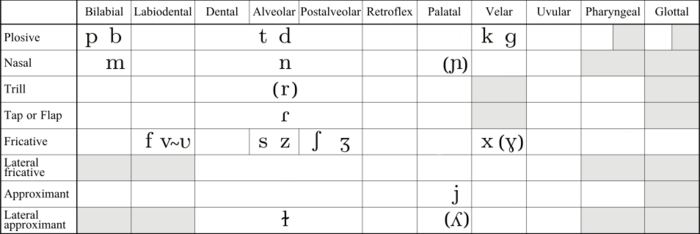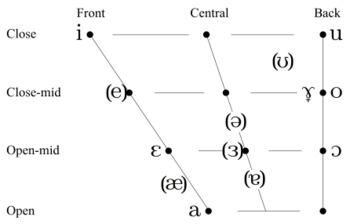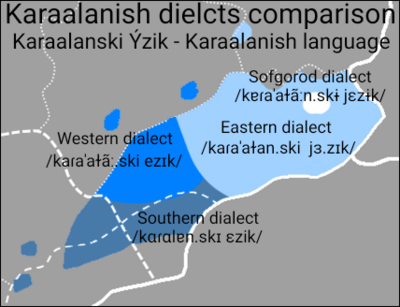Karaalani language: Difference between revisions
Admiral S.S. (talk | contribs) |
Admiral S.S. (talk | contribs) |
||
| Line 86: | Line 86: | ||
=Introduction= | =Introduction= | ||
The Language has [https://en.wikipedia.org/wiki/Slavic_languages slavic root and grammar], and has | The Language has [https://en.wikipedia.org/wiki/Slavic_languages slavic root and grammar], and has 6 cases. Karaalani is slightly influenced by its bordering languages, like the Belgorian dialects, but it has managed to stay to its roots, quriosly it has words that sound very similar to words in the Kentalian langauge of {{flag|Kentalis}}. | ||
=Writing System= | =Writing System= | ||
Karaalani has two official scripts (Both Alphabets), an adapted version of the [https://en.wikipedia.org/wiki/Coptic_alphabet Protopolyash script] used in the Belgorian language, and the prefered Karaalani variant of the [https://en.wikipedia.org/wiki/Early_Cyrillic_alphabet Old Govoric alphabet] (commonly reffered to as the ''Iraklic script'' after the Karaalani who standerdised it), which drops certain nasal letters, but keeps others. Some people preffer to use a modified latin alphabet too, which has also been standerdised. | Karaalani has two official scripts (Both Alphabets), an adapted version of the [https://en.wikipedia.org/wiki/Coptic_alphabet Protopolyash script] used in the Belgorian language, and the prefered Karaalani variant of the [https://en.wikipedia.org/wiki/Early_Cyrillic_alphabet Old Govoric alphabet] (commonly reffered to as the ''Iraklic script'' after the Karaalani who standerdised it), which drops certain nasal letters, but keeps others. Some people preffer to use a modified latin alphabet too, which has also been standerdised. | ||
Revision as of 09:25, 12 February 2021
This article is incomplete because it is pending further input from participants, or it is a work-in-progress by one author. Please comment on this article's talk page to share your input, comments and questions. Note: To contribute to this article, you may need to seek help from the author(s) of this page. |
| Karaalani language | |
|---|---|
| Karaalan, Karaalanish | |
| Караалански Ѣзик Ⲕⲁⲣⲁⲁⲗⲁⲛⲥⲕⲏ Ⳉⲍⲏⲕ Karaalanski Ýzik | |
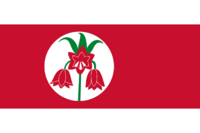 Ethnic Flag of the Karaalani people | |
| Pronunciation | /kaɾaˈaɫan.skɪ jɜ.zɪk/ |
| Native to | └→ |
| Region | Slavic Belt in Thuadia |
| Ethnicity | Karaalani Slavs |
Native speakers | L1: 17,980,000 L2: 1,200,000- FL: 25,000 |
Thuado-Thrismaran languages
| |
Standard forms | Eastern Karaalani Dialect
|
| Dialects |
|
| Modified Old Govoric alphabet Protopolyash script | |
| Official status | |
Official language in | └→ |
Recognised minority language in | |
| Language codes | |
| ISO 639-1 | KR |
| ISO 639-2 | KRA |
| ISO 639-3 | KRA |
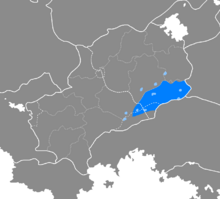 Distribution of the language Absolute majority >30% of native speakers | |
Karaalani language is a Slavic language out of Kento-Polyash language group, which is a (co-)official language of the Karaalan region of Monte Blanco, Mustelaria.
Introduction
The Language has slavic root and grammar, and has 6 cases. Karaalani is slightly influenced by its bordering languages, like the Belgorian dialects, but it has managed to stay to its roots, quriosly it has words that sound very similar to words in the Kentalian langauge of ![]() Kentalis.
Kentalis.
Writing System
Karaalani has two official scripts (Both Alphabets), an adapted version of the Protopolyash script used in the Belgorian language, and the prefered Karaalani variant of the Old Govoric alphabet (commonly reffered to as the Iraklic script after the Karaalani who standerdised it), which drops certain nasal letters, but keeps others. Some people preffer to use a modified latin alphabet too, which has also been standerdised.
| Numeric vallue |
Iraklic version | Adapted Protopolyash version |
Latin version | IPA Symbol |
|---|---|---|---|---|
| 1 | А а | Ⲁ ⲁ | A a | /а~ɑ/ |
| 2 | Б б | Ⲃⲃ ⲃⲃ | B b | /b/ |
| 3 | В в | Ⲃ ⲃ | V v | /v~ʋ/ |
| 4 | Г г | Ⲅ ⲅ | G g | /g/ |
| 5 | Д д | Ⲇ ⲇ | D d | /d/ |
| 6 | Е е | Ⲉ ⲉ | E e | /ɛ~e/ |
| 7 | Ж ж | Ϧ ϧ | Ž ž | /ʒ/ |
| 8 | З з | Ⲍ ⲍ | Z z | /z/ |
| 9 | И и | Ⲏ ⲏ | I i | /i/ |
| 10 | Й й | Ⲓ ⲓ | Y y | /j/ |
| 20 | К к | Ⲕ ⲕ | K k | /k/ |
| 30 | Л л | Ⲗ ⲗ | L l | /ɫ/ |
| 40 | М м | Ⲙ ⲙ | M m | /m/ |
| 50 | Н н | Ⲛ ⲛ | N n | /n/ |
| 100 | О о | Ⲟ ⲟ | O o | /ɔ/ |
| 200 | Ѡ ѡ/ω | Ⲱ ⲱ | Ó ó | /o/ |
| 300 | П п | Ⲡ ⲡ | P p | /p/ |
| 400 | Р р | Ⲣ ⲣ | R r | /ɾ~r/ |
| 500 | С с | Ⲥ ⲥ | S s | /s/ |
| 1,000 | Т т | Ⲧ ⲧ | T t | /t/ |
| 2,000 | У у | Ⲩ ⲩ | U u | /u/ |
| 3,000 | Ф ф | Ⲫ ⲫ | F f | /f/ |
| 4,000 | Х х | Ⲭ ⲭ | H h | /x/ |
| 5,000 | Ц ц | Ϯ ϯ | C c (Ts ts) |
/t͡s/ |
| 10,000 | Ԃ ԃ | Ⳁ ⳁ | Dz dz | /d͡z/ |
| 20,000 | Ч ч | Ϫ ϫ | Č č | /t͡ʃ/ |
| 30,000 | Ҷ ҷ | Ϥ ϥ | Ď đ | /d͡ʒ/ |
| 40,000 | Ш ш | Ⲋ ⲋ | Š š | /ʃ/ |
| 50,000 | Щ щ | Ϣ ϣ | Št št | /ʃt/ |
| 100,000 | Ъ ъ | Ϩ ϩ | Ă ă | /ɤ̞~ɤ~ə/ |
| 200,000 | Ѣ ѣ | Ⳉ ⳉ | Ý ý | /jæ~jɜ/ /ɛ-e/ in Western & Southern dialects |
| 300,000 | Ь ь | Ϭ ϭ | Y y | /◌ʲ/ |
| 400,000 | Ю ю | Ⲓⲩ ⲓⲩ | Yu yu | /ju/ |
| 500,000 | Я я | Ⲓⲁ ⲓⲁ | Ya ya | /ja/ |
| 1,000,000 | Ꙗ ꙗ | Ⲏⲁ ⲏⲁ | Ia ia | /ɪa~ɪja/ |
| 2,000,000 | Ѥ ѥ | Ⲓⲉ ⲓⲉ | Ye ye | /je/ |
| 3,000,000 | Ѫ ѫ | Ⲓⲱ ⲓⲱ | Yó yó | /jɔ~jo/ |
| 4,000,000 | Ѯ ѯ | Ⲝ ⲝ | X x (Ks ks) |
/ks/ |
| 5,000,000 | Ѱ ѱ | Ⲯ ⲯ | Ps ps | /ps/ |
- а̀ varia (grave accent), indicating stress on the last syllable (U+0300)
- а́ oksia (acute accent), indicating a stressed syllable (U+0301)
- а҃ titlo, indicating abbreviations, or letters used as numerals (U+0483)
The old way to write numerals works by adding letters up, for example 115 would be spelled with the corespouding letters for the numerals 100-10-5 with a titlo on top.
Phonology
.
Phonotactics
WIP
- all "oj"s have becomes "jo"s in karaalan, compared to Varnolan
- -
- -
Nouns
Grammatical Gender
Karaalani has 3 grammatical genders
- Masculine - all masculine nouns end in a consonant sound
- Feminine - all feminine nouns end in /a/
- Neuter - all neuter nouns end in /o/ or /ɛ/
Grammatical Cases
Karaalani has 6 grammatical cases.
- Nominative: Subject or a Predicate noun or adjectiv
- Dative: Giving to Subject
- Accusative: Interract with Subject (hear, hit, harm...)
- Locative: In Subject, on Subject
- Vocative: Referring to Subject, calling Subject
| Translation to Common | Singular | Plural | |||||||||||
|---|---|---|---|---|---|---|---|---|---|---|---|---|---|
| Nom. | Dat. | Acc. | Gen. | Loc. | Voc. | Nom. | Dat. | Acc. | Gen. | Loc. | Voc. | ||
| Masculine | |||||||||||||
| Man | Mъж Ⲙϩϧ Măž |
Мъжу | Mъжом | Мъжа | Mъждо | Mъжо! | Mъже | Muзеу | Mъжем | Мъжи | Мъжде | Mъже! | |
| Leader | Войвод | Войводу | Войводом | Войвода | Войводо | Войводе! | Войводи | Войводеу | Войводем | Войводи | Войводе | Войводе! | |
| Feminine | |||||||||||||
| Church | Църква | Църкву | Църквом | Църкве | Църквѥ | Църкво! | Църкви | Църквеу | Църквѥм | Църкви | Църквѥй | Църкве! | |
| Woman | Жена | Жену | Женом | Жене | Женѥ | Жено! | Жени | Женеу | Женѥм | Жени | Женѥй | Жени! | |
| Neuter | |||||||||||||
| Sea | Moре | Moро | Мором | Мора | Морю | Moрé! | Moретa | Moрѣ | Морѣм | Морете | Морѥ | Moрeтá! | |
| Place | Мѣсто | Мѣсту | Мѣстом | Мѣсте | Мѣстю | Мѣстé! | Мѣста | Мѣстѣ | Мѣстѣм | Мѣста | Мѣстѥ | Мѣстетá! | |
Adjectives
TBA
Pronouns
TBA
Numbers
Karaalani uses a decimal system.
Numbers sample
| Number (Base 10) |
Number term (Karaalani) |
IPA | Number (Base 10) |
Number term (Karaalani) |
IPA | |
|---|---|---|---|---|---|---|
| 0 | Нѡла Ⲛⲱⲗⲁ Нóla |
/no.wa/ | 11 | Ѣдинадѥсед Ⳉⲇⲏⲛⲁⲇⲓⲉⲥⲉⲇ Ýdinadesed |
/jɜdɪn.adɛsed/ | |
| 1 | Ѣдно Ⳉⲇⲛⲟ Ýdno |
/jɜd.nɔ/ | 12 | Ԃванадѥсед Ⳁⲃⲁⲛⲁⲇⲓⲉⲥⲉⲇ Dzvanadesed |
/dzva.nadɛsed/ | |
| 2 | Ԃве Ⳁⲃⲉ Dzve |
/dzvɛ/ | 13 | Тринадѥсед Ⲧⲣⲏⲛⲁⲇⲓⲉⲥⲉⲇ Trinadesed |
/tɾi.nadɛsed/ | |
| 3 | Три Ⲧⲣⲏ Tri |
/tɾi/ | 14 | Чѣтеринадѥсед Ϫⳉⲧⲉⲣⲏⲛⲁⲇⲓⲉⲥⲉⲇ Čýterinadesed |
/t͡sjɜˈtɛɾi.nadɛsed/ | |
| 4 | Чѣтери Ϫⳉⲧⲉⲣⲏ Čýteri |
/t͡sjɜˈtɛɾi/ | 15 | Пятнадѥсед Ⲡⲓⲁⲧⲛⲁⲇⲓⲉⲥⲉⲇ Pyatnadesed |
/pjat.nadɛsed/ | |
| 5 | Пят Ⲡⲓⲁⲧ Pyat |
/pjat/ | 16 | Шеснадѥсед Ⲋⲉⲥⲛⲁⲇⲓⲉⲥⲉⲇ Šesnadesed |
/ʃɛs.nadɛsed/ | |
| 6 | Шес Ⲋⲉⲥ Šes |
/ʃɛs/ | 17 | Седемнадѥсед Ⲥⲉⲇⲉⲙⲛⲁⲇⲓⲉⲥⲉⲇ Sedemnadesed |
/sɛdɛm.nadɛsed/ | |
| 7 | Седем Ⲥⲉⲇⲉⲙ Sedem |
/sɛdɛm/ | 18 | Ѫсемнадѥсед Ⲓⲱⲥⲉⲙⲛⲁⲇⲓⲉⲥⲉⲇ Yósemnadesed |
/jɔsɛm.nadɛsed/ | |
| 8 | Ѫсем Ⲓⲱⲥⲉⲙ Yósem |
/jɔsɛm/ | 19 | Дѥведнадѥсед Ⲇⲓⲉⲃⲉⲇⲛⲁⲇⲓⲉⲥⲉⲇ Dyevednadesed |
/djɛvɛd.nadɛsed/ | |
| 9 | Дѥвед Ⲇⲓⲉⲃⲉⲇ Dyeved |
/djɛvɛd/ | 100 | Стѡ Ⲥⲧⲱ Stó |
/sto/ | |
| 10 | Дѥсед Ⲇⲓⲉⲥⲉⲇ Dyesed |
/djɛsɛd/ | 1000 | Хиляда Ⲭⲏⲗⲓⲁⲇⲁ Hilyada |
/xilʲada/ |
Verbs
TBA
Adverbs
TBA
Prepositions
TBA
Conjunctions
TBA
Particles
TBA
Interjections
TBA
Language examples
Dialects
Karaalanish has 4 recognized dialects, the (standart) Eastern, Western, Southern and Sofgorod dialects.
The Western and Southern dialects differ mainly from the Eastern and Sofgorod dialects by the fact they dont pronounce the /j/ in the letter Ѣ/Ⳉ/Ý, which in the standert Eastern dialect is pronounced as /jæ~jɜ/, and in Sofgorod as /jɛ/. The Southern dialect dosent pronounce the stress in double characters, like in the word 'Karaalanski' ('Karaalanish'), insted of (standart Eastern) /kaɾaˈaɫan.ski/ it becomes /kɑɾɑlan.skɪ/. It also always pronounces Л/Ⲗ/L as an /l/. The Western dialect has nasal vowels when followed after 'n', some epakers in the far west parts pronounce their r's like /ʁ/s, sum ppl consider it a seperate dialect, tho officially its recognized as an 'accent'. The Sofgorod dialect conbines nasalization with the the /n/s and pornounces most i's as /ɨ/s and has a lot of 'unstressing'.
Lord's prayer
Following text shows Lord's prayer written in Karaalani
| Common language | Karaalani (Iraklic) | Karaalani (Protopolyash) | Karaalani (Latin) | |
|---|---|---|---|---|
| Our Father in heaven, | Оче наш, кѫто си нѥбо, | Ⲟϫⲉ ⲛⲁⲋ, ⲕⲓⲱⲧⲟ ⲥⲏ ⲛⲓⲉⲃⲃⲟ, | Oče naš, kyóto si nyebo, | |
| hallowed be your name. | да се свѥти йимем ти, | ⲇⲁ ⲥⲉ ⲥⲃⲓⲉⲧⲏ ⲓⲏⲙⲉⲙ ⲧⲏ, | da se svyeti yimem ti, | |
| Your kingdom come. | да дойде царстѡ ти, | ⲇⲁ ⲇⲟⲓⲇⲉ ϯⲁⲣⲥⲧⲃⲟ ⲧⲏ, | da doyde carstó ti, | |
| Your will be done, | да буде вѡля ти, | ⲇⲁ ⲃⲃⲩⲇⲉ ⲃⲱⲗⲓⲁ ⲧⲏ, | da bude vólya ti, | |
| on earth as it is in heaven. | како нѥбо, тако и земѫ. | ⲕⲁⲕⲟ ⲛⲓⲉⲃⲃⲟ, ⲧⲁⲕⲟ ⲏ ⲍⲉⲙⲓⲱ. | kako nyebo, tako i zemyo. | |
| Give us this day our daily bread | Нѥвний ни хлѣб ним дай нес | Ⲛⲓⲉⲃⲏⲓ ⲛⲏ ⲭⲗⳉⲃⲃ ⲛⲏⲙ ⲇⲁⲓ ⲛⲉⲥ | Nyewniy ni hlýb nim day nes | |
| and forgive us our debts, | и ни прости наши дългове, | ⲏ ⲛⲏ ⲡⲣⲟⲥⲧⲏ ⲛⲁⲋⲏ ⲇϩⲗⲅⲟⲃⲉ, | i ni prosti naši dălgove, | |
| as we also have forgiven our debtors. | како ние проставаме нашите длъжничеу. | ⲕⲁⲕⲟ ⲛⲏⲉ ⲡⲣⲟⲥⲧⲁⲃⲁⲙⲉ ⲛⲁⲋⲏⲧⲉ ⲇⲗϩϧⲛⲏϫⲉⲩ. | kako nie prostawame našite dlăžničeu | |
| And do not bring us into temptation, | И нѥ ним въвеждай ву изкушенѥ, | Ⲏ ⲛⲓⲉ ⲛⲏⲙ ⲃϩⲃⲉϧⲇⲁⲓ ⲃⲩ ⲏⲍⲕⲩⲋⲉⲛⲓⲉ, | I nye nim văvežday vu izkušenye | |
| but rescue us from the evil one. | но ним избави от Лъкави. | ⲛⲟ ⲛⲏⲙ ⲏⲍⲃⲃⲁⲃⲏ ⲟⲧ Ⲗϩⲕⲁⲃⲏ. | no nim izbavi ot Lăkavi. |
